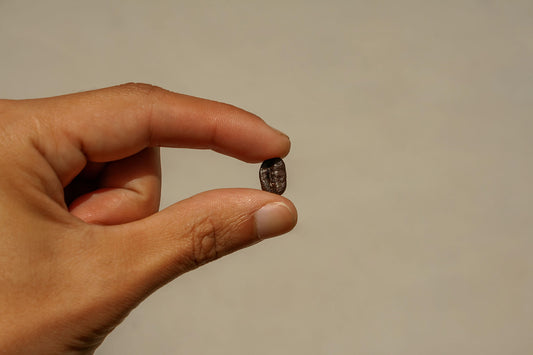Locally grown coffee has many hidden health benefits, and we'll show you how these hidden gems are good for you and the planet.
Find out how these beans increase metabolism, what kind of powerful antioxidants they contain, and if this can lower the risk of developing chronic diseases. By exploring the origins of native coffee varieties, we can find out how sustainable practices and the protection of heirloom varieties are good for people's health.
Native coffee has numerous hidden benefits throughout the whole coffee-making process. Read this blog to find out how each beverage has a story to tell about sustainability, cultural diversity, and the undeniable medical benefits they provide.
/ IN THIS ARTICLE
01. Historical Significance of Native Coffee in the Philippines
02. Nutritional Profile of Native Coffee
03. Antioxidant Properties of Native Coffee
04. Native Coffee and Mental Alertness
05. Cardiovascular Health Benefits
06. Native Coffee and Diabetes Management
07. Traditional Preparation Methods
08. Comparing Native Coffee with Commercial Varieties
09. Juju Blends’ Special Coffee Blend
14. Frequently Asked Questions
15. Conclusion
Historical Significance of Native Coffee in the Philippines
The historical significance of native coffee in the Philippines stretches back to the 18th century, marking the beginning of its journey as an integral part of the Filipino culture and economy. The first coffee beans planted in the Philippines were Liberica beans, introduced by two Spanish Franciscan friars in 1740. These beans were planted in the elevated, cool plantations of Lipa, Batangas, a region that would later be recognized as the birthplace of Philippine coffee culture. This pivotal moment ignited what is often referred to as the golden era of Philippine coffee, spanning almost 150 years.
The significance of coffee in the Philippines is not only rooted in its early introduction but also in its dramatic impact on the nation's social and economic fabric. By the 1800s, the Philippines emerged as the fourth largest coffee-producing nation, thanks to the fertile lands that proved ideal for coffee cultivation. This agricultural success story was short-lived, however, as the country faced numerous challenges, including coffee rust disease in the late 19th century, which devastated a significant portion of the coffee crops.
Despite these adversities, coffee remained a staple in Filipino life, symbolizing much more than a mere beverage. It represented resilience, community, and the spirit of the Filipino people. Today, the Philippines produces several types of coffee, including Arabica, Robusta, Liberica (Barako), and Excelsa, each contributing distinct flavors and experiences that reflect the rich biodiversity and heritage of the islands.
Coffee in the Philippines transcends its role as an economic product; it is deeply woven into the country's cultural landscape, featuring prominently in social gatherings, rituals, and daily routines. The phrase "but first, coffee" resonates strongly within the Filipino context, emphasizing coffee's position as a prerequisite for any significant engagement or transaction.
As coffee continues to be an essential part of the Filipino lifestyle, efforts to preserve and promote native coffee varieties are intensifying. These endeavors serve not only to safeguard the biodiversity of the Philippines but to sustain the rich cultural traditions and historical significance that coffee embodies in this island nation.
Nutritional Profile of Native Coffee
Coffee's nutritional profile varies depending on the type of bean, how it is prepared, and whether or not additional ingredients are added. However, it is widely known that coffee, especially native coffee, contains certain vital compounds that are beneficial to human health. This is a brief overview of what native coffee usually has to offer.
1. Vitamins and Minerals:
Native coffee contains small amounts of certain vitamins and minerals. A typical cup of black coffee contains:
- Vitamin B2 (Riboflavin): 11% of the Reference Daily Intake (RDI)
- Vitamin B5 (Pantothenic Acid): 6% of the RDI
- Vitamin B1 (Thiamine): 2% of the RDI
- Vitamin B3 (Niacin): 2% of the RDI
- Folate: 1% of the RDI
- Manganese: 3% of the RDI
- Potassium: 3% of the RDI
- Magnesium: 2% of the RDI
- Phosphorus: 1% of the RDI
2. Antioxidants
3. Caffeine
4. Fibre
Surprisingly, brewed coffee does contain soluble dietary fiber, in slightly varying amounts depending on the brewing method.
5. Water
Lastly, coffee is mostly water. This implies that a standard cup could contribute towards your daily fluid intake.
Native coffee, particularly when consumed black and without any additives, is virtually calorie-free, making it suitable for most diets. That’s why most diets includes drinking a cup of black coffee because of the benefits of drinking coffee.
Antioxidant Properties of Native Coffee
Coffee's antioxidants are well known for their potential health benefits, primary among which is their capacity to lower the risk of diseases associated with oxidative stress. Having a cup of coffee from your native area increases your intake of important antioxidants, which have been linked to a lower risk of developing a number of chronic conditions. These beneficial substances scavenge dangerous free radicals from cells, potentially improving general health and lowering the risk of diseases like heart disease and some forms of cancer. Moreover, coffee's advantages—especially its antioxidant content—have been researched in relation to maintaining brain function and averting neurodegenerative diseases. Because of these ingredients, coffee becomes much more than just a stimulating beverage; it becomes a natural ally in promoting overall health and possibly lowering the risk of disease.
Native Coffee and Mental Alertness
Caffeinated coffee has a significant impact on mental alertness and cognitive function, especially when made from native beans. Caffeine, a naturally occurring stimulant with direct effects on the central nervous system, is the secret ingredient. When you drink coffee, the caffeine inhibits adenosine, a neurotransmitter that helps your brain relax signals. Other neurotransmitters like dopamine and norepinephrine rise when this substance is inhibited, which causes an increase in neuronal firing. This explains why drinking coffee in the morning causes you to become more mentally alert.
Active caffeine intake can be a powerful ally, not only for boosting your energy but also for improving various aspects of brain health. Case in point, caffeine has been associated with a reduced risk of neurological diseases like Alzheimer's and Parkinson's. It also holds potential for protecting against other mental health conditions such as depression.
Coffee consumption has a significant effect on energy levels, combating fatigue and boosting attentiveness. That explains why a lot of us reach for coffee when we're in the afternoon slump or before tackling a difficult task that calls for prolonged focus. Coffee contains caffeine, which enters your bloodstream and makes its way to your brain, where it causes the "fight-or-flight" hormone, adrenaline, to be released. This improves physical performance and gives you a temporary energy and productivity boost.
It's crucial to control coffee intake in order to reap all of these advantages. Overindulging in caffeine may have adverse effects like jitteriness or sleep disturbance. Most healthy adults can safely consume up to 400 milligrammes of caffeine per day, or four eight-ounce cups of brewed coffee, according to the consensus of medical experts.
Cardiovascular Health Benefits
While it's critical not to view coffee as a panacea for cardiovascular disease, it is evident that, when consumed as part of a balanced diet, it can positively contribute to heart health. Importantly, the preparation of the coffee (e.g., avoiding high-fat dairy products or large amounts of sugar) can also have a significant impact on its cardiovascular health benefits.
1. Lower Risk of Heart Disease
There is a consistent link between consistent use of native coffee and a decreased risk of heart disease. Coffee contains antioxidants, particularly trigonelline and chlorogenic acid, which may help heal damaged heart tissue and lessen inflammation, improving general heart health.
2. Reduced Risk of Stroke
Numerous studies have indicated that moderate coffee consumption may protect against stroke in addition to heart disease, especially in women. Coffee's anti-inflammatory and antioxidant qualities are thought to contribute to these possible health advantages for women.
3. Blood Pressure Moderation
While it is true that coffee can raise blood pressure temporarily, long-term research has consistently failed to find any conclusive link between regular coffee consumption and a persistent rise in blood pressure. According to some research, people who drink coffee frequently may even grow tolerant to these effects.
4. Improved Blood Vessel Health
Frequent coffee consumption has been associated with better blood vessel health. Coffee's antioxidants can improve blood vessel function, raise insulin sensitivity, and possibly lower the risk of heart disease.
5. Lower Risk of Heart Failure
Heart failure risk has been linked to moderate regular coffee consumption. A potential sweet spot of two to three cups per day was found in a study, and those who continued to drink this amount had a lower likelihood of heart failure than those who drank less.
6. Potential Benefits for Men's Health
Some research suggests that men who drink coffee may be less likely to die from prostate cancer. Additionally, the most prevalent kind of skin cancer, basal cell carcinoma, can be less likely to develop if coffee is consumed.
7. Cholesterol Control
According to recent research, coffee's antioxidant qualities may help regulate cholesterol levels, which will improve cardiovascular health.
Native Coffee and Diabetes Management
Coffee seems to have a lot of potential for use as a supportive measure for diabetes management, even though it shouldn't take the place of a balanced diet and regular exercise. It seems that regular consumption of coffee, especially native coffee, may actually help lower the risk of Type 2 diabetes and aid in blood sugar regulation as research on the connection between coffee and health continues. Coffee should always be consumed individually and moderately, though, as it can have varying effects on different people.
- Reduced Risk of Type 2 Diabetes: A lower risk of Type 2 diabetes has been linked to regular coffee consumption, according to numerous scientific studies. Coffee contains compounds like quinides and chlorogenic acid that may have this advantageous effect, though the precise mechanisms are still being investigated.
- Blood Sugar Management: Consuming coffee, both caffeinated and decaffeinated, may aid in controlling blood sugar, a crucial component of managing diabetes. The aforementioned chlorogenic acid may have an impact on glucose metabolism and reduce sugar absorption.
- Reduced Insulin Resistance: Long-term coffee drinking is linked to increased insulin sensitivity. Since the body can use insulin more efficiently when there is increased insulin sensitivity, blood sugar control may become more feasible and the risk of Type 2 diabetes may be lowered.
- Protective Antioxidants: Coffee's high antioxidant content may shield body cells from oxidative stress, which can cause long-term conditions like diabetes. They have been connected to enhanced glucose metabolism, which adds even more health advantages to coffee.
- Weight Management: A modest amount of weight loss is linked to increased coffee consumption, which may also help manage obesity, a major risk factor for Type 2 diabetes. This is thought to be because caffeine increases fat oxidation and metabolic rates.
- Long-Term Benefits: It was discovered that long-term coffee drinkers had a statistically significant decreased risk of type 2 diabetes. This implies that coffee's positive effects on insulin sensitivity and blood sugar regulation may compound over time.
Traditional Preparation Methods
The Philippines has a distinctive blend of local culture and traditional coffee making thanks to its deeply ingrained cultural methods of coffee preparation. The delectable dark-roasted coffee drinks we enjoy today are the result of these rich customs that have been passed down through the generations.
The first step in making traditional coffee in the Philippines is choosing premium local coffee beans. After being hand-picked, the cherries are sun-dried, sorted, and roasted. Native coffee preparation involves roasting the beans, which yields a robust, dark roasted coffee full of flavour. The beans are typically roasted until they are a deep, dark brown colour.
One traditional coffee preparation method involves the use of a "sibor" or "suklob" - a fabric filter shaped like a sock stretched over a wooden or metal hoop. The coffee grounds are placed inside the fabric and hot water is poured over it. Gravity pulls the water through the coffee grounds, extracting the coffee as it goes, and the coffee drips into the pot or cup below. This simple and yet effective method extracts the best of the coffee flavors while leaving behind unwanted residues.
The “Kapeng Barako” or Barako Coffee, made from liberica beans, is a famous aromatic coffee drink originating from Batangas, Philippines. The traditional brewing techniques for Kapeng Barako involve boiling coarse coffee grounds with water and then sweetening it with muscovado sugar.
Another unique preparation method is the preparation of "Kapeng Kanin," where leftover rice is mixed with the native coffee blend. This coffee drink allows Filipinos to maximize resources while adding a unique taste and texture to their morning cup.
Each of these traditional coffee brewing methods embraces an important part of the Filipino culture. While the preparation methods vary, each technique accentuates the rich flavors, aroma, and robust character of native Filipino coffee, offering a unique coffee experience.
Comparing Native Coffee with Commercial Varieties
Both native and commercial coffee have their unique benefits and characteristics. While commercial coffee ensures consistency, native coffee offers unique flavors and aromas, potentially more health benefits due to its traditional organic farming and processing, and is often lower in environmental impact.
- Taste Profile: Native coffee varieties generally exhibit unique, complex taste profiles reflecting the local soil and climate conditions where they are grown, also known as "terroir." In contrast, commercial coffee varieties often blend beans from various origins, resulting in a more generic flavor.
- Health Comparison: Health comparison between regular coffee vs. native coffee generally reveals higher antioxidant content in native coffee due to organic cultivation and traditional processing methods. Commercial coffee varieties, particularly those that are heavily processed, may lose some of these benefits during production.
- Coffee Drinking Experience: Native coffee offers a more authentic coffee drinking experience, with flavors and aromas reflective of its specific growing region. Commercial coffees, on the other hand, are often geared towards consistency in taste, which can be less distinctive.
- Nutritional Profile Comparison: Both native coffee and commercial varieties contain beneficial compounds such as caffeine and antioxidants. However, native coffee is typically grown in nutrient-rich, diverse soils, leading to a potentially superior nutritional profile.
- Chemical Additives: Commercial coffee varieties often go through extensive processing and may include additives for flavor enhancement and preservation, while native coffee is likely to be pure and free of such additives.
- Environmental Impact: Native coffee, which tends to be grown in smaller quantities and in a more eco-friendly manner, often has a lower environmental impact than commercial coffee. This is another aspect of their "benefits" beyond direct health implications.
- Coffee Beans Comparison: One key differentiation is the bean type. Native coffee usually involves specific, local bean types known for their quality and distinct flavor. Commercial coffee, however, often uses a blend of beans from different regions, which may affect the overall quality, flavor, and health benefits of coffee.
Juju Blends’ Special Coffee Blend
Juju Blends takes pride in its special coffee blend, a meticulously crafted concoction designed to captivate the senses while promoting wellness. This unique coffee blend combines the richness of indigenous coffee beans, harvested from the fertile lands that have been nourished by natural, ancestral practices. The result is a coffee drink that not only indulges the palate with its unique flavors but also enhances health, embodying the true essence of the health benefits of drinking coffee.
The special blend from Juju Blends, including Collagen Coffee Latte and Moringa Matcha Latte, are distinguished by its aromatic profile and a spectrum of flavors that range from subtly fruity to richly earthy, offering an unparalleled coffee experience. The beans are carefully roasted to preserve their natural antioxidants, contributing to the overall coffee blend health benefits. Consuming Juju Blends coffee can introduce a variety of health advantages, including improved cognitive function, enhanced metabolism, and a bolstered immune system, thanks to the natural compounds found in these premium beans.
Beyond the pleasure that comes with each sip, the Juju Blends coffee blend stands as a testament to the brand’s commitment to sustainability and support for local farming communities. By choosing this special blend, coffee lovers are not only treated to its unique flavors but are also contributing to a healthier lifestyle. Juju Blends combines tradition with innovation, offering a coffee drink that delights the senses while offering significant health perks.
Frequently Asked Questions
What are the health benefits of drinking native coffee?
Native coffee boasts several health benefits due to its rich nutrient and antioxidant content. These benefits can include improved cognitive function, elevated mood, boosted metabolism, and potentially a lowered risk of certain diseases. However, health impacts can vary among individuals and are influenced by factors like the amount of coffee consumed, the addition of sugar or cream, and personal health status.
Does native coffee have a higher caffeine content compared to commercial coffee?
The caffeine content in native coffee can vary depending on the species of coffee plant, the method of preparation, and serving size. Generally, it's comparable to that of most commercial coffees. It's always a good idea to check with the supplier or producer for specific caffeine details about their beans.
Can I still reap the health benefits from decaffeinated coffee?
Yes, many of the health benefits of coffee come from its antioxidants, which are still present in decaffeinated coffee. However, it's worth noting that the decaffeination process might reduce the number of certain beneficial compounds in the coffee.
How many cups of coffee per day are considered safe to drink?
While this can vary widely based on individual tolerance to caffeine, a commonly recommended limit is between 3 to 5 cups per day for a healthy adult. However, the cups per day should consider total caffeine intake from all sources. Always seek medical advice if you're unsure.
Can I drink coffee if I have a pre-existing medical condition?
It depends on the condition. While coffee has health benefits, certain individuals might need to limit their consumption due to conditions like anxiety, insomnia, certain heart conditions, or pregnancy. When uncertain, it's best to consult with a health care professional. They can provide guidance based on your personal health history and current condition.
Conclusion
In conclusion, native coffee is an integral part of Filipino culture and lifestyle, offering a blend of rich tradition and numerous health benefits. With its unique flavors and aroma, native coffee captures the essence of the Philippines' fertile lands and biodiversity. Its moderate caffeine content can provide a stimulating effect, enhancing mental alertness and cognitive function, which is beneficial for the fast-paced lifestyle of the modern Filipino. Simultaneously, the antioxidant properties inherent in native coffee contribute to overall wellness, combating oxidative stress and potentially warding off chronic diseases.
The traditional methods of cultivation and preparation place native coffee at the heart of sustainable living, echoing the Filipino value of harmony with nature. For those seeking a healthier lifestyle, the benefits of drinking coffee, especially native blends, can support both physical health and environmental well-being.




